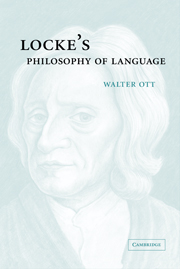Book contents
- Frontmatter
- Contents
- Acknowledgements
- Note on textual references
- Introduction
- 1 Signs and signification
- 2 Particles and propositions
- 3 Essence and abstraction
- 4 Locke contra the Aristotelians: signification and definition
- 5 Beyond the bounds of sense?
- 6 The reception of Locke's philosophy of language
- 7 Conclusion
- Bibliography
- Index
1 - Signs and signification
Published online by Cambridge University Press: 22 September 2009
- Frontmatter
- Contents
- Acknowledgements
- Note on textual references
- Introduction
- 1 Signs and signification
- 2 Particles and propositions
- 3 Essence and abstraction
- 4 Locke contra the Aristotelians: signification and definition
- 5 Beyond the bounds of sense?
- 6 The reception of Locke's philosophy of language
- 7 Conclusion
- Bibliography
- Index
Summary
Any discussion of Locke's views on language must begin by explicating his central linguistic notion: signification. This is by no means an easy task, as the sheer variety of available conceptions of signification will attest. Nevertheless, Locke's text clearly commits him to an understanding of signification applicable not only to words but to ideas themselves. Once we unearth this concept, we shall be in a position to come to terms with Locke's arguments for his seemingly counter-intuitive claim that words signify ideas.
WHAT IS LOCKEAN SIGNIFICATION?
Near the start of Book III of An Essay Concerning Human Understanding, Locke puts forth what I shall call the “linguistic thesis”: “Words in their primary or immediate Signification, stand for nothing, but the Ideas in the Mind of him that uses them” (I.ii.2: 405). It is helpful to have before us some other statements of the thesis:
The use then of Words, is to be sensible Marks of Ideas; and the Ideas they stand for, are their proper and immediate Signification.
(III.ii.1: 405)Words, as they are used by Men, can properly and immediately signify nothing but Ideas, that are in the Mind of the Speaker …
(III.ii.4: 406)[Words'] signification [in a man's use of them] … is limited to his Ideas, and they can be Signs of nothing else.
(III.ii.8: 408)Obviously, we cannot make a start on interpreting these claims until we know what Locke intends by “signification.”
- Type
- Chapter
- Information
- Locke's Philosophy of Language , pp. 7 - 33Publisher: Cambridge University PressPrint publication year: 2003



